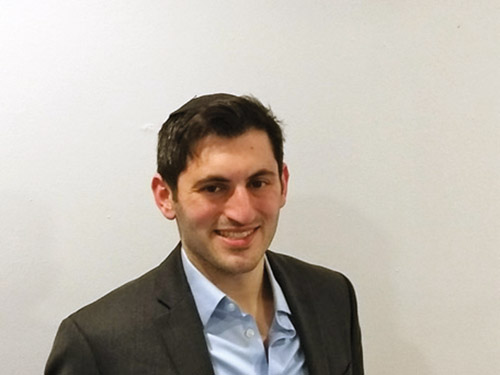



Reviewing “The Man Across the River” by Zvi Wiesenfeld. Amsterdam Publishers 2021. Paperback. 154 pages. ISBN-13: 978-9493231061.
Zvi Wiesenfeld knew three incontrovertible facts about his beloved grandfather. He survived the Holocaust but rarely talked about it. He was gentle, kind and humble. He often screamed in his sleep.
In 2016, nine years after his grandfather passed away, Wiesenfeld was struck with a troubling thought. Survivors were passing into history, and his would be the last generation to personally know one. He resolved to research and write his grandfather’s story as a way of preserving memories of his grandfather for his family and future generations.
“Man Across the River” is a biographical novel combining the history Wiesenfeld pieced together with a fictional overlay. The book was a labor of love, researched and written over several years while he began his career as a forensic accountant, studied for and passed the CPA exam, and married and moved from Philadelphia to Teaneck, his wife Sara’s hometown.
Wiesenfeld needed all the skills he was learning as a forensic accountant to dig up information about his grandfather. From interviews with his grandfather’s relatives and friends, requests for information from Yad Vashem and YIVO that brought a treasure trove of documents, and reading widely about the period, the outline of Jacob Wiesenfeld’s horrendous experiences during the Holocaust slowly emerged.
Wiesenfeld had enough information for a lengthy article but not a fully fleshed out biography. “If I wanted to write something more substantial, something my parents could hold, I would have to find a way to fill in the details myself,” explained Wiesenfeld in a phone interview. “That’s why I thought about writing a biographical novel. The structure of the story is totally true, but I had to take educated guesses about the dates and make up some of the characters and the dialogue. I had an innate understanding of how my grandfather would have acted in certain situations. By tapping into that, words flowed out of me.”
The stories Weisenfeld unearthed may come as a shock. We are all sadly familiar with Auschwitz. But does the name Transnistria cause the same shudder in your spine? It should.
“Man across the River” begins in 1937, with an introduction to 15-year-old Yankel (Jacob) Wiesenfeld, an Orthodox Jew who lives in the Romanian city of Czernowitz with his parents and older brother, Zushe.
Yankel belongs to the Zionist Betar group, a source of worry to the older, stronger Zushe. His dream of immigrating to the Holy Land ends when the Germans conquer the region. The Jews were first confined to a ghetto and then sent to Transnistria, which is translated as “the land across from the River Dniester.” Wiesenfeld details in the book how Hitler set up the region to be a killing field for Romanian Jews. “Hitler told Ion Antonescu, the Conducator, (dictator), of Romania to take this strip of Ukraine and kill the Jews there,” said Wiesenfeld. Run by Romanians, who were not organized and systematic like the Germans, the Nazis of Transnistria did the job by forcing the Jews to work themselves to death, freeze, starve, die of illness or succumb to the Einsatzgruppen shooting squads.
This disorganization enabled some of the Jews to venture out from the barracks where they were held. After several people interviewed recalled Jacob Wiesenfeld talking about how the Ukrainian peasants were very kind and tried to help the prisoners by giving them food, Wiesenfeld included fictionalized encounters in the book. “We think of Ukraine as an anti-Semitic country, but my grandfather was always thankful for them—he said he owed them his life.”
Yankel endured watching his parents and brother die and came close to perishing many times. He was with a group of prisoners who were forced to dig a mass grave, and then shot so that they fell into the pit. A Jew who had been in hiding came across the bodies. He detected movement from Yankel and pulled him out. But more trouble lay ahead. The Russians who took over the area treated him and then sent him to the front as a soldier, where he spent the next two years. Wiesenfeld knew that his grandfather actually ran ammunition to the front lines, a very dangerous job; in the book, he imagines his grandfather surviving land mines and more anti-Semitism before being released. After he was discharged, Jacob Wiesenfeld made his way to a DP camp in Italy and then to New York, where relatives took him in and helped him start a new life.
When Wiesenfeld pieced together some of the documents he obtained about his grandfather, he saw that the two years between being rescued and arriving at the DP camp were blank. He surmised that his grandfather withheld information about Russian army service, afraid of attracting misplaced scrutiny at a time when the Cold War with the Soviet Union was escalating.
Wiesenfeld initially planned to self-publish the book. His wife, Sara, did the first round of edits. He then hired an editor and cover designer to shape his manuscript into a finished product. But a second round of queries brought back a “yes” from Amsterdam Publishing in October. Since the book was already almost finished, the publishing process took only a few months. It is available on Amazon and at Barnes & Noble.
Wiesenfeld skillfully weaves the threads of history with an engaging narrative. Reading Holocaust memoirs can be emotionally draining. What got me to the finish line was knowing there was a somewhat happy ending. Jacob Wiesenfeld survived to build a beautiful family, including a grandson who cared enough to write a book that keeps his memory alive while documenting the era’s brutality.
By Bracha Schwartz













